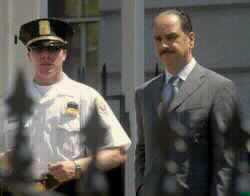HIGHLIGHTS: Saddam was Interviewed by George Galloway, a Labour Left-wing Member of Parliament||Interview Seen as an Attempt to Drive Wedge Between Britain and America||In Washington, U.S., Iraqi Opposition Discuss Government After Saddam|| STORY: Iraqi President Saddam Hussein has told a British member of parliament that he will implement United Nations resolutions and allow arms inspectors into his country, a Sunday newspaper reported.
Saddam said he "accepted and would implement" all UN security council resolutions on Iraq, including giving "unfettered access" to sites which were denied to inspections teams which left the country four years ago, The Mail on Sunday said.
He also warned during an interview, given deep in an underground bunker, that his people would not surrender in the event of an anticipated US-led attack on his country.
Saddam was interviewed by George Galloway, a left-wing member of parliament for Britain's ruling Labour Party and a long-time supporter of Iraq, who was received in Baghdad on Thursday.
During his visit, Galloway, a columnist for the Scottish edition of the Mail on Sunday, also briefed Saddam of activities undertaken by a number of leading political and trade union figures in Britain to mobilise public opinion against London's participation in any military campaign.
Deliberately echoing the words of Britain's wartime leader Winston Churchill, Saddam told Galloway: "If they come, we are ready. We will fight them on the streets, from the rooftops, from house to house. We will never surrender."
As Britain battled against Germany during World War II, Churchill famously said: "We shall fight on the beaches. We shall fight on the landing grounds. We shall fight in the fields, and in the streets, we shall fight in the hills. We shall never surrender."
Saddam said: "Churchill and the British meant what they promised their would-be invaders. So do we."
His interview was seen in London as an attempt to drive a wedge between Britain and America.
"Without us it will be that much harder for America to invade," The Mail on Sunday quoted a senior British foreign policy adviser as saying.
Saddam also told the weekly paper: "If Britain were to find a more independent policy -- one which took more account of its own interests and less to the interests of others -- your country could begin to recover its once-significant status in the Arab world."
He added: "We don't know why you turned against us more than any other European country ... Iraq has never harmed Britain nor its interests. In fact, we were a very profitable part of Britain's interests in the Arab world."
US President George W. Bush is expected to call on London's help in any military campaign to topple Saddam and halt Iraq's alleged development of weapons of mass destruction.
U.S., IRAQ, OPPOSITION DISCUSS GOVERNMENT AFTER SADDAM
In Washington, the United States stepped up pressure on "enemy" Iraq, holding high-level, symbolic talks on Saturday with Iraqi opposition groups on how to fill the void if Washington follows through on threats to topple President Saddam Hussein.
Vice President Dick Cheney and Defense Secretary Donald Rumsfeld agreed in talks with an Iraqi delegation on the need to establish democracy in the event that the U.S. goal of ousting Saddam is realized, the often fractious and sometimes discredited opposition groups said.
"It was absolutely clear to us that the United States is completely serious, committed and determined to bring about a regime change in Iraq," Sharif Ali Bin AlHussein of the Iraqi National Congress told reporters.
"We were very heartened by what we heard and we will be passing on the message to the Iraqi people that their liberation is, God willing, going to happen soon," he said
PHOTO CAPTION
Sharif Ali, a member of the Iraqi National Congress, walks pass security after spending 2 1/2 hours at the White House following a video conferencce with Vice President Dick Cheney, who is spending part of August at his Wyoming home, Saturday, Aug. 10, 2002. President Bush said Saturday he is consulting with Congress and U.S. allies about Iraq and branded Saddam Hussein "an enemy until proven otherwise. (AP Photo/Rick Bowmer)
- Author:
& News Agencies - Section:
WORLD HEADLINES


 Home
Home Discover Islam
Discover Islam Quran Recitations
Quran Recitations Lectures
Lectures
 Fatwa
Fatwa Articles
Articles Fiqh
Fiqh E-Books
E-Books Boys & Girls
Boys & Girls  Hajj Rulings
Hajj Rulings Hajj Fatwas
Hajj Fatwas














